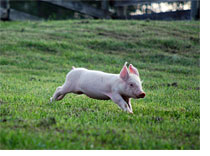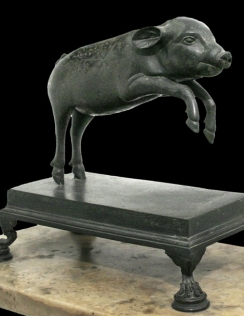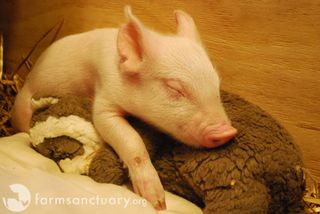Epicureanism and Sympathy for Animals
 There are several famous passages by Epicurean-influenced authors that indicate a profound sympathy for the feeling of animals. Consider:
There are several famous passages by Epicurean-influenced authors that indicate a profound sympathy for the feeling of animals. Consider:
Lucretius in Book II of De Rerum Natura: (“A calf, struck down before some god’s august demesne, lies fallen near the incense-bearing altar, the warm blood flowing from his breast. His mother, bereft, wanders in search through upland green, distinguishes this cloven print from that one, surveys all regions, hoping for a glimpse of her lost young one, fills the leafy groves with plaintive lowing, comes to the stall again, at a standstill in her heartbreak. Osiers, grass dew-fresh, streams running level with their banks, can hold no charm for her, nor turn her mood away from sorrow.”)
Virgil in Book III of the Georgics: (“See, the ox falls smoking under the plow’s weight. and spews blood mixed with foam from his mouth, and heaves his last groans. The plowman goes sadly to unyoke the bullock that grieves for its brother’s death, and leaves the blade stuck fast in the middle of its work.”)
Diogenes Laertius: Epicurean Wise Man Saying: “The wise man will be fond of the countryside.” (not explicit as to animals, but I think similar in implication).
We also know that the expression of being “a hog of Epicurus’ herd” seems to have been in vogue in ancient times (Horace). And we know that the Boscoreale cup portrays a piglet at Epicurus’ feet, and of course we have the famous leaping pig statue from Herculaneum.
With these in mind, consider the Farm Sanctuary page, and view some of their videos — most of which are very touching. I wonder what the attitude of the ancient Epicureans was on the issue of proper treatment of farm animals. I tend to doubt that Epicurus was a vegetarian, but on the other hand it seems very likely that he would take a dim view of the “concentrated feeding” operations in use today, where the conditions in which the animals are kept are very difficult to see without averting one’s eyes. (I am tempted to post one or more here, but let’s reserve that for those who want to follow the links.) Those intensive feeding operations seem almost like “concentration camps” for animals — animals which, like pigs, are very intelligent and certainly sensitive enough to appreciate their conditions.
I frankly am not sure what I think the proper view of this issue should be under the principles of Epicurus. I am tempted to conclude that — just as with men — Nature demands that we take fully into account the natural life-spans of animals. If so, would that mean that it is Naturally appropriate to raise farm animals with the intent to kill and eat them, but only after they have lived a natural life span and would normally die anyway? Or is it acceptable to slaughter them after only a few happy years in the pasture, on the grounds that like men their years should be measured not in years but in happiness? Does it mean that using sheep for wool, chickens for eggs, and cows for milk is fine, but slaughtering cattle for meat at any age is wrong? What is the proper attitude toward our “Epicurean mascot” — the pig? They produce neither milk nor eggs, but they seem to grow so large that in adulthood they can hardly move. Is it appropriate to slaughter them by age, or by size, or not at all?
What do you think? Any comments are welcome! As I generally have comments turned off on this blog, please leave comments either on the Epicurus or the NewEpicurean facebook pages.
In closing, reconsider our Herculaneum leaping piglet, and compare him to the other photos in this post (from the FarmSanctuary page):

And let’s apply the motto in the banner of this page:
Sic fac omnia tamquam spectet Epicurus! Thus do all things as though Epicurus were watching!
What would Epicurus say if he saw our modern intensive feeding and slaughterhouse operations?
Click here to take survey (this is a test for a new surveymonkey tool I am exploring)

